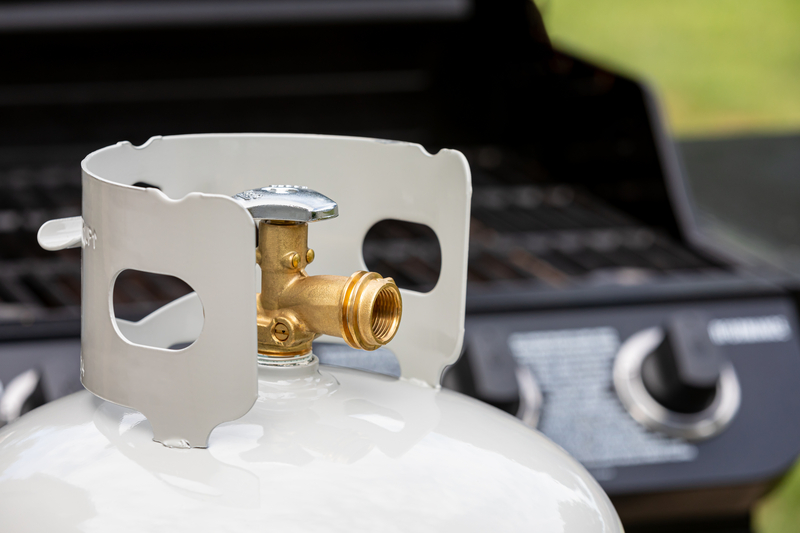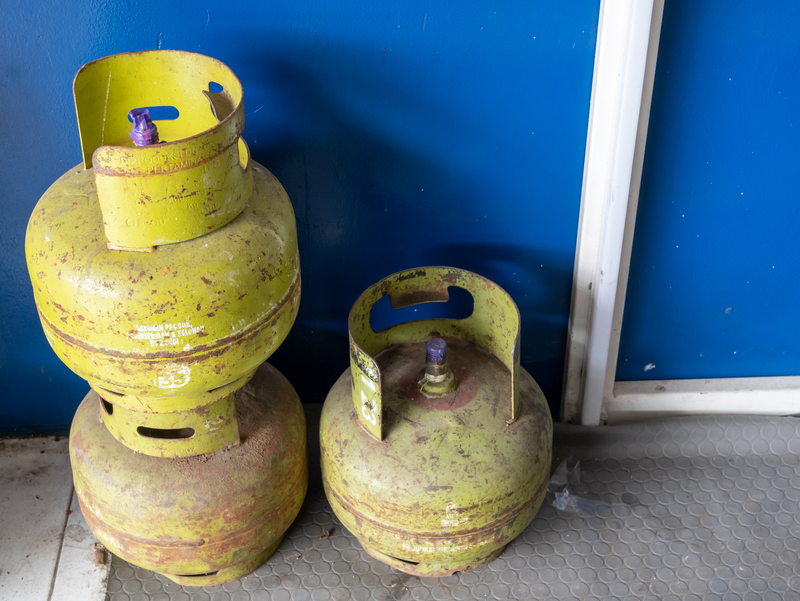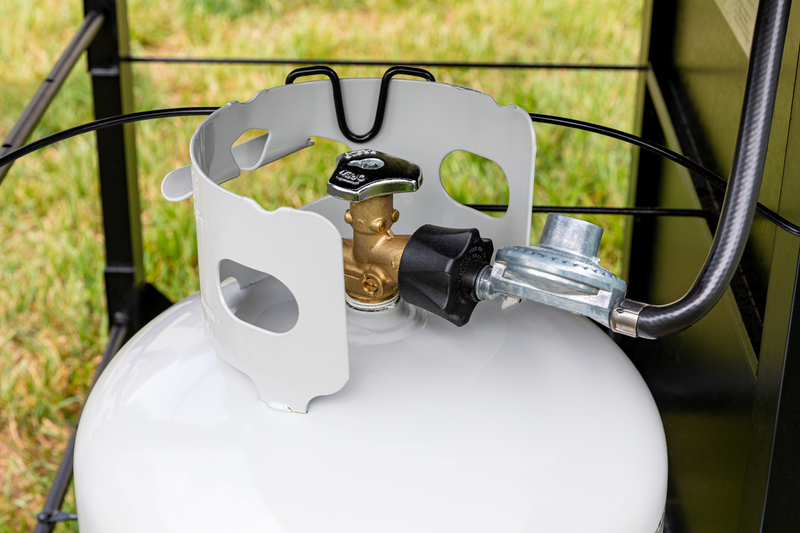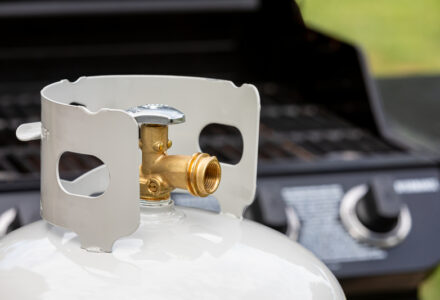This content has been archived. It may no longer be relevant
 Propane is a colorless and odorless flammable gas that belongs to the family of liquefied petroleum gases (LPGs).
Propane is a colorless and odorless flammable gas that belongs to the family of liquefied petroleum gases (LPGs).
It is derived from both natural gas processing and crude oil refining.
Propane is a versatile fuel source commonly used for heating, cooking, and powering appliances in various settings, including homes, businesses, and industries.
It is also a popular fuel choice for outdoor grills or BBQs, allowing for easy and convenient cooking and grilling.
However, it is important to safely handle propane and store it properly to avoid potential safety hazards, particularly when using it for outdoor cooking.
It is also used as a fuel for vehicles, forklifts, and other types of transportation.
Propane is stored in pressurized tanks or cylinders and is widely available throughout the world.
Understanding Propane Shelf Life
Propane has an indefinite shelf life, which means it does not expire or spoil in the traditional sense.
However, it can still degrade over time, which can affect its quality and performance.
The shelf life of propane depends on several factors, such as the quality of the propane, the storage conditions, and the age of the propane.
Propane is a stable gas that does not react with other substances in the environment, but it can slowly degrade over time due to exposure to air, moisture, and other contaminants.
This degradation can cause the propane to lose its efficiency and burn less cleanly, which can lead to issues such as reduced heat output, increased emissions, and decreased appliance performance.
To maximize the shelf life of propane, it is essential to store it properly and handle it safely.
Propane should be stored in a cool, dry, and well-ventilated area, away from direct sunlight and heat sources.
It should also be kept away from flammable materials, such as gasoline, oil, and other chemicals.
Also utilizing a cover to protect a propane tank during storage can be beneficial in safeguarding it against external elements and potential damage
Additionally, propane tanks should be inspected regularly for signs of damage, such as cracks, rust, or corrosion.
Any damaged tanks should be replaced immediately to avoid leaks and other safety hazards.
Overall, while propane does not have a specific shelf life, it is still important to take precautions to ensure that it is stored and handled properly to maintain its quality and performance over time.
Signs of Propane Deterioration
Propane can deteriorate over time due to exposure to air, moisture, and other contaminants.
This degradation can affect the quality and performance of the propane, which can lead to several signs of deterioration.
Here are some common signs of propane deterioration.
- Foul Odor. Propane is naturally odorless, but a strong, unpleasant odor can develop when propane deteriorates. The odor is caused by the presence of sulfur compounds, which are produced when propane breaks down.
- Color Changes. Propane should be colorless, but it can turn yellow or brown when it deteriorates. This color change is caused by the presence of impurities and contaminants in the propane.
- Reduced Efficiency. Deteriorated propane may burn less efficiently, which can lead to reduced heat output and increased fuel consumption. This can cause appliances to run less efficiently and can increase the cost of propane usage.
- Corrosion. Deteriorated propane can cause corrosion in propane tanks and appliances. This can result in leaks and other safety hazards.
- Pressure Changes. Deteriorated propane may have lower pressure than fresh propane. This can affect the performance of appliances and may cause them to malfunction.
If you notice any of these signs of propane deterioration, it is important to handle the propane with caution and seek professional assistance.
Deteriorated propane can pose safety hazards, so it is essential to take proper precautions and dispose of it safely.
Can You Use Old Propane?
 It is generally not recommended to use old or deteriorated propane, as it can pose safety hazards and may not perform as well as fresh propane.
It is generally not recommended to use old or deteriorated propane, as it can pose safety hazards and may not perform as well as fresh propane.
Deteriorated propane can cause appliances to run less efficiently, which can lead to increased fuel consumption and reduced heat output.
Additionally, deteriorated propane can cause corrosion in propane tanks and appliances, which can result in leaks and other safety hazards.
If you suspect that your propane is old or deteriorated, it is important to handle it with caution and seek professional assistance.
Propane should never be disposed of in the trash or poured down the drain, as this can pose serious safety and environmental risks.
Instead, you can contact your local propane supplier or hazardous waste disposal facility for advice on how to dispose of old or deteriorated propane safely.
They can provide guidance on the proper procedures for disposal and ensure that the propane is handled and disposed of in compliance with local regulations and safety guidelines.
In summary, while it is possible to use old propane, it is not recommended due to the potential safety hazards and reduced performance.
It is important to handle propane safely and dispose of it properly to avoid any risks to yourself or the environment.
How to Store Propane Safely
Propane is a flammable gas, so it is essential to store it safely to avoid any potential safety hazards.
Here are some tips on how to store propane safely.
- Choose a Safe Location. Propane should be stored in a cool, dry, and well-ventilated area, away from any heat sources, sparks, or flames. It should also be stored in a location where it is not at risk of being damaged or hit by vehicles or heavy equipment.
- Store Propane Tanks Upright. Propane tanks should always be stored in an upright position to prevent them from tipping over or leaking. Tanks should also be secured in place to prevent them from moving or falling.
- Keep Tanks Away from Flammable Materials. Propane tanks should be kept away from flammable materials such as gasoline, oil, and other chemicals, as they can increase the risk of fire or explosion.
- Check for Leaks. Propane tanks should be checked regularly for leaks by using a propane gas leak detector or soapy water solution. Any leaks should be repaired immediately by a qualified professional.
- Inspect Tanks Regularly. Propane tanks should be inspected regularly for signs of damage, such as cracks, rust, or corrosion. Any damaged tanks should be replaced immediately to avoid leaks and other safety hazards.
- Follow Proper Handling Procedures. When handling propane tanks, it is important to follow proper safety procedures, such as wearing appropriate safety gear, using caution when connecting or disconnecting tanks, and never smoking or using open flames near propane.
By following these safety tips, you can help ensure that propane is stored safely and free from any potential safety hazards.
It is important to handle propane carefully and always seek professional assistance if you are unsure about any aspect of propane storage or handling.
Bottom Line – Does Propane Go Bad?
 In conclusion, propane is a versatile and useful fuel source that can be used for heating, cooking, and other applications.
In conclusion, propane is a versatile and useful fuel source that can be used for heating, cooking, and other applications.
However, it is important to be aware of its shelf life and signs of deterioration, and to store it safely to avoid any potential safety hazards.
If you suspect that your propane is old or deteriorated, it is recommended to dispose of it safely and obtain fresh propane for use.
Additionally, propane tanks should be stored in a cool, dry, and well-ventilated area, away from any heat sources or flammable materials.
By following proper safety procedures and handling propane carefully, you can help ensure that propane is used safely and efficiently.
If you have any questions or concerns about propane usage or storage, it is important to seek professional assistance to ensure that you are taking the necessary precautions to protect yourself and others from potential safety hazards.

